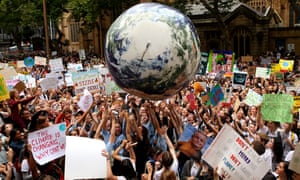Extract from The Guardian
The climate strike must be a beginning and not an end. Warming won’t be stopped by symbolism
During
the carnage of the first world war, the poet Wilfred Owen revisited the
biblical story in which God tests Abraham by commanding the sacrifice
of Isaac, his son. In Genesis, Abraham dutifully prepares the lad for
slaughter before God relents and tells him to offer a ram instead.
Owen’s bitter poem rewrites the ending:
'But the old man would not so, but slew his son,
Owen’s bitter poem rewrites the ending:
'But the old man would not so, but slew his son,
And half the seed of Europe, one by one.'The parable illustrates global warming just as well as war – except, with CO2 levels higher than at any other time in human history, it’s a planet rather than a continent now under the knife.
That’s what makes the climate strike so fitting: an international rebellion led by the young against generations of betrayal. We know that, as far back as the late 50s, researchers for the oil industry understood the effects of carbon on the atmosphere but did nothing about it.
In 1988 George HW Bush promised on the campaign trail to fight climate change. “I am an environmentalist,” he declared. “Those who think we are powerless to do anything about the greenhouse effect are forgetting about the White House effect.”
There was, of course, no White House effect.
In 1997 the world’s leaders signed the Kyoto protocol, with Bill Clinton declaring “a commitment from our generation to act in the interests of future generations”. More emissions have been released since that agreement than in all of previous history.
How petty, how small, how childish do those politicians with the temerity to attack Greta Thunberg look! She speaks for science, idealism and hope; they embody an ignorance or cynicism so deep as to constitute depravity.
The ecological disaster that confronts us today extends way beyond climate. Some scientists speak of the “sixth extinction event” – but, as Justin McBrien argued, that phrase isn’t accurate.
We might less euphemistically discuss a “first extermination event”. Nature is not dying so much as being killed, by people who know perfectly well what they’re doing.
The need for protests could not be more urgent – and, at last, they’re happening. The global strike provides a perfect antidote to the despair so many of us have felt for so long.
There’s a nightmarishness to the isolated experience of climate change: a sense of paralysis and horror at a world sleepwalking into disaster. By coming together on the streets, we shake that off, and we grasp something of our collective strength.
In day-to-day life, there are few sections of society more powerless than schoolchildren. And yet, despite teachers and parents and politicians, they’ve spurred a movement that’s growing in almost every nation.
If they can do that, what else could be possible? What might the rest of us do, if we all act together?
Fairly obviously, the strike must be a beginning and not an end. This is not an issue where you can express your disapproval in a single rally and then go back to your daily life.
Atmospheric physics doesn’t care if we’re tired of marching or we feel that “done our bit”. Warming won’t be stopped by symbolism or fervent hopes: we need, as, the Intergovernmental Panel on Climate Change argues, “rapid, far-reaching and unprecedented changes in all aspects of society”.
That’s no small task, especially given the vested interests in the status quo. It would be foolish not to expect difficult times ahead.
In 1848 Marx described the February insurgency in France as “the beautiful revolution” – and then contrasted it with the “ugly revolution” that followed. He meant that the initial uprising (a “revolution of universal sympathy”) united everyone other than utter reactionaries. It was only later that the divergent interests among the rebels became clear.
The same might be said today.
Will those businesses who encouraged their workers to strike support further stoppages? What about progressive politicians – will they back ongoing actions? How can we prevent protests falling back into tokenism? What kind of alliances might take the movement forward and what kind of deals will set it back? How does civil disobedience relate to the push for a Green New Deal?
All of these and other questions must be debated – and the necessary debates will be polarising, fractious and, yes, ugly. Again, though, the climate strike shows the basis for the struggle we need.
All over the globe, people have rejected the sacrifice of nature on the altar of greed. That should inspire us all to redouble our efforts. We need a new movement, akin to those that shook the world in the 60s and the 70s, and we have very little time to build one.
- Jeff Sparrow is a Guardian Australia columnist

No comments:
Post a Comment